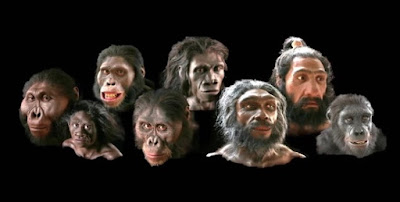Nature vs. Nurture in the 20th Century
I watched this documentary and found it informative about the early 20th Century history of the idea of human genetic determinism.
Although the film is fairly objective
in its approach and what it presents, it regrettably tells only part of the 20th
Century nature vs. nurture story. The film is missing the subsequent responses
to these early theories of human genetic determinism, including those of supporters
and more importantly those of their detractors.
To its credit the film does contain some
accurate though horrific truths about 20th Century European and
American political and scientific intrusion in Africa. For its educational
value alone the documentary is worth watching.
In terms of the early 20th
Century thinkers who promoted the notion of human genetic determinism the film
focuses mostly on William
Hamilton, George
Price, and later thinkers such as Richard Dawkins who
were influenced by them.
It gives no mention of scientists and
authors such as Sigmund
Freud, B.F. Skinner,
Nikolass Tinbergen,
Konrad Lorenz, Irenäus
Eibl-Eibesfeldt, Desmond
Morris, Robert Ardrey,
E. O. Wilson, Richard Herrnstein,
Charles Murray, James Watson,
Jonathan Haidt, and others,
particularly many science writers and neuroscientists during the 1990s. The
foregoing have, to greater and lesser degrees, also contributed to the
biologizing of human behavior. They have done so by insisting that genetics and
neurophysiology are more powerful than, in fact override, culture and learning
in determining what humans think and do.
Here are other related topics:
If you are like many in the U.S., you
are not sure if nature trumps nurture in determining human behavior, or vice
versa. Or, you think there is probably a balance between the influences of genetics
and learning.
The idea of human genetic determinism
has had a strong and lasting influence on the Western public despite its harmfulness
to individual wellbeing and human relations. If you want to fully understand
where the idea of human genetic determinism came from, go to the links of the above
named persons. While there, give attention to the criticisms of their research
and findings.
You can also read on. First, biologist
and philosopher Massimo Pigliucci has this
to say:
“[W]hile there
are fixed elements to our being, we are not fixed beings, since we are (or
ought to be) free to choose our projects. Neither biology nor natural obstacles
limit our futures to a great extent, and how we live out our human nature will
vary because we give different meanings to our facticities. An authentic life
is about acknowledging these differences, and stretching ourselves into an open
future. It does not follow that this openness is unlimited or unconstrained. We
are limited, but mostly by our own imagination.”
For more but not a full course on the
nature-nurture debate try the following, my two takes on these ill-founded,
unsupported and harmful notions of human neuro-genetic determinism:
and


Comments
Post a Comment